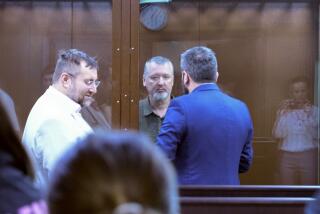After 60 Years, Soviets Air New View of Trotsky’s Role
- Share via
MOSCOW — For the first time in six decades, the key role played by Leon Trotsky in the Russian Revolution and the establishment of the Soviet state was formally acknowledged in the Soviet Union on Friday.
A senior Soviet historian, writing in the Communist Party newspaper Pravda, said Trotsky was “not the enemy of the revolution and socialism,” as the party has held for 60 years, but rather an enemy of the dictator Josef Stalin. Trotsky warned the country that Stalin would only bring disaster, wrote Col. Gen. Dmitri Volkogonov.
Volkogonov describes Trotsky as the Communists’ most popular leader, after V. I. Lenin, the founder of the Soviet state, during the 1917 Bolshevik Revolution and the civil war that followed.
While Volkogonov stops well short of calling for Trotsky’s political rehabilitation--and provides considerable arguments against it--he effectively overturns one of the main tenets of Soviet orthodoxy, which made Trotskyism a virtual curse.
Volkogonov outlines a number of Trotsky’s ideas for the first time since the 1920s in the official Soviet press. Included are Trotsky’s prophetic warnings about Stalin and his biting critique of the Soviet system as developed under the dictator.
Many other leading revolutionaries jailed or executed under Stalin as counterrevolutionaries, foreign agents or allies of Trotsky have been rehabilitated recently and cleared of criminal and political charges. But Trotsky’s case will be judged differently, Volkogonov suggests, because of his ambiguous role within the party as he fought with Stalin for the leadership after Lenin’s death in 1924.
“Trotsky loved himself in revolution more than he loved the revolution itself,” Volkogonov says of the man who organized the uprising that brought the Bolsheviks to power, formed and led the Red Army and later served as foreign minister and defense minister of the young Soviet state.
Trotsky’s main flaw, Volkogonov suggested, was not really his radical leftist position but his endless scheming in an attempt to wrest leadership of the party from Stalin.
“Essentially, it was precisely through fighting Trotskyism that Stalin became not only the leader of the party but its theoretician,” he said.
Trotsky’s ‘Halo’ Tarnished
“The halo of Trotsky as ‘the hero of the revolution’ became tarnished after 1925,” he added. “In the eyes of the proletariat, he now appeared as a demagogue, a failed dictator, a ‘politician.’
“Imposing one discussion after another on the party, Trotsky unwillingly reinforced Stalin’s authority as the party leader. This may sound paradoxical, but no other person contributed so much to the consolidation of Stalin’s position at the head of the party column as Trotsky.”
In a major Kremlin speech last November, Mikhail S. Gorbachev, the present Communist Party leader, credited Stalin with preventing a takeover of the party by Trotsky and his supporters in the late 1920s and said Stalin was defending the orthodox line set down by Lenin.
“This was essentially an attack on Leninism all down the line,” Gorbachev said, referring as much to current controversies as to the party struggles 60 years ago. “The party’s leading nucleus, headed by Josef Stalin, safeguarded Leninism in an ideological struggle.”
But even as he catalogued Trotsky’s political errors and shortcomings, Volkogonov made clear that his expulsion from the party in 1927, his deportation two years later and his murder in 1940 all stemmed from his long feud with Stalin, who feared him as a rival.
Access to Secret Archives
Volkogonov, a military historian who is writing a two-volume biography of Stalin and has had unprecedented access to still-secret Kremlin archives, implicitly accepts the long-held Western belief that Trotsky was murdered in Mexico by a Soviet agent acting on Kremlin orders, if not on a personal directive from Stalin.
The decision to kill Trotsky was formed, Volkogonov suggested, when Stalin read a 1936 book by Trotsky, “The Revolution Betrayed,” which not only accused Stalin of leading the Soviet Union into disaster but also predicted his downfall.
“Trotsky had to be removed from the political scene,” Volkogonov wrote Friday. “The (Kremlin) leader’s Caesarean ambitions could not be completed while the distant exile was still alive.”
Noting considerable speculation that Lavrenty P. Beria, the head of the secret police under Stalin, “was the main executor and organizer of the decision concerning Trotsky,” Volkogonov said he thought it would be difficult to find documentary evidence for or against this in the foreseeable future.
The son of a prosperous Jewish farmer, Trotsky, whose original name was Lev D. Bronstein, was long active in radical politics and came back from exile to help direct the 1917 coup that brought the Bolsheviks to power in czarist Russia.
Red Army Leader
As a deputy to Lenin, he was first commissar for foreign affairs, then commissar for war, creating and commanding the Red Army in a civil war against counterrevolutionaries.
He is known as the main advocate of the “Theory of Permanent Revolution,” which held that the Russian revolution, combining a bourgeois democratic and a socialist revolution, would be a prelude to an uprising by the proletariat throughout Europe.
Although he disagreed with many of Trotsky’s views and criticized his political style, Volkogonov praised him for maintaining and developing his own line after losing to Stalin in the power struggle.
“Trotsky must be given his due,” Volkogonov said. “He did not break, as many others did, before Stalin’s dictatorship. And to the end of his days, he always referred to Lenin with respect.”
More to Read
Sign up for Essential California
The most important California stories and recommendations in your inbox every morning.
You may occasionally receive promotional content from the Los Angeles Times.








